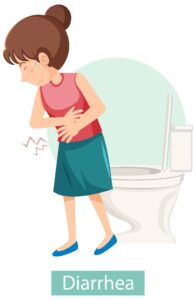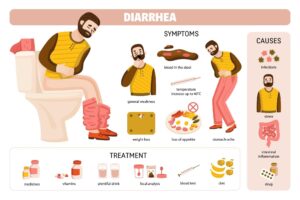Last updated on September 26th, 2024 at 11:15 am
Diarrhea treatment refers to the medical and self-care measures used to alleviate the symptoms of diarrhea, including rehydration, dietary adjustments, and, if necessary, medications to manage the underlying cause or symptoms.
Diarrhea can strike suddenly and disrupt your daily life. Diarrhea is characterized by frequent, loose, and watery stools, often accompanied by abdominal cramps and discomfort.
Diarrhoea Symptoms
Diarrhea can result from a wide range of factors, including:
- Infections: Many cases of diarrhea are caused by infections from bacteria, viruses, or parasites. Common culprits include E. coli, rotavirus, norovirus, Salmonella, and Giardia.
- Dietary Factors: Certain foods and beverages can irritate the gastrointestinal tract and lead to diarrhea. Spicy foods, excessive caffeine, alcohol, and artificial sweeteners are known triggers for some individuals.
- Medications: Some medications, such as antibiotics, laxatives, and antacids containing magnesium, can disrupt the natural balance of gut bacteria, leading to diarrhea as a side effect.
- Food Poisoning: Consuming contaminated or undercooked food can result in food poisoning, which often manifests as diarrhea nausea and vomiting.
- Chronic Conditions: Chronic conditions like irritable bowel syndrome (IBS), Crohn’s disease, ulcerative colitis, and celiac disease can cause recurrent or chronic diarrhea.

Diarrhea Treatment
Diarrhea, characterized by frequent, loose, and watery stools, is a common digestive issue that can range from mild to severe. While it’s often a self-limiting condition that resolves on its own, it can be quite uncomfortable and potentially dangerous if left untreated, particularly if it leads to dehydration. Let’s explore various treatments for diarrhea, from home remedies to medical interventions.
Fluid Replacement:
One of the primary goals of diarrhea treatment is to prevent or treat dehydration, which can be a serious consequence of frequent loose stools. Rehydration is crucial for maintaining the body’s electrolyte balance. To achieve this:
- Oral Rehydration Solution (ORS): Commercial ORS solutions are available over-the-counter and can be highly effective in replacing lost fluids and electrolytes. These solutions contain a precise balance of salt and sugar that aids in absorption and rehydration.
- Clear Fluids: In addition to ORS, clear fluids like water, clear broths, and herbal teas should be consumed in abundance to keep the body hydrated.
- Avoid Dehydrating Beverages: Steer clear of caffeinated drinks (coffee, tea, cola), alcohol, and sugary beverages, as they can exacerbate dehydration.
> Consult a doctor and Order Medicine Online
BRAT Diet:
The BRAT diet, consisting of Bananas, Rice, Applesauce, and Toast, has long been recommended for individuals with diarrhea. These foods are considered easy to digest and can help bulk up stools. However, it’s important to note that the BRAT diet is not as widely endorsed as it once was because it lacks some essential nutrients. It may be appropriate for short-term relief, but a more balanced diet should be resumed as soon as tolerated.

Probiotics:
Probiotics are beneficial bacteria that can help restore the balance of your gut microbiota, potentially reducing the duration and severity of diarrhea. They are available in various forms, including supplements and probiotic-rich foods like yoghurt with live cultures. Probiotics like Lactobacillus and Bifidobacterium strains are commonly used for diarrhea management.
Dietary Adjustments:
While the BRAT diet can provide temporary relief, it’s important to transition back to a more balanced diet once your symptoms improve. Gradually reintroduce foods like lean proteins, fruits, and vegetables, which can provide essential nutrients and help your digestive system return to normal.
Avoid Trigger Foods:
Identify and avoid all the foods and beverages that worsen your diarrhea symptoms. Common triggers include spicy foods, dairy products (for those with lactose intolerance), high-fibre foods, and artificial sweeteners. It’s essential to listen to your body and adapt your diet accordingly.
Rest and Stress Management:
Rest is crucial during diarrhea recovery, as physical and emotional stress can exacerbate symptoms. Finding relaxation techniques, such as deep breathing exercises or meditation, can help reduce stress and promote healing.
Medications of Diarrhea
In some cases, healthcare providers may recommend medications to address specific causes of diarrhea:
- Antibiotics: If a bacterial infection is responsible for your diarrhea, antibiotics may be prescribed to target and eliminate the offending bacteria.
- Anti-diarrheal Medications: Over-the-counter medications like loperamide (Imodium) can help slow down bowel movements and reduce the frequency of loose stools. However, they are not recommended for individuals with fever or bloody diarrhea, as they can worsen the underlying condition in some cases
Conclusion:
Diarrhea is a common condition that can affect individuals of all ages and backgrounds. While it can be uncomfortable and disruptive, understanding its causes and following appropriate diarrhea treatment strategies can alleviate discomfort and help you return to your daily activities more quickly. Always seek medical attention when necessary, and remember that proper prevention measures can go a long way in avoiding this inconvenient digestive woe.
Do Generic Medicine Work the Same as Branded Medicine
Generic medicines are designed to be equivalent to their brand-name counterparts in terms of safety, quality, and efficacy. They contain the same active ingredients and meet strict regulatory standards.
Read: What are Generic Medicines?
Generic drugs work in the same way as brand-name drugs and have the same therapeutic effects. The main difference is the cost, as generics are typically more affordable. However, it’s important to consult with a healthcare professional before switching between brand-name and generic medications to ensure they are suitable for your specific condition.
FAQs on Diarrhea Treatment
Q1. What is Diarrhea treatment?
Diarrhea treatment involves rehydration to replace lost fluids and electrolytes, dietary adjustments, and, in some cases, medications to address underlying causes or symptoms.
Q2. Can I treat diarrhea with antibiotics?
Antibiotics are typically prescribed for bacterial infections causing diarrhea, but they may not be suitable for viral or non-infectious cases. Seek guidance from a medical professional for a precise assessment of your condition.
Q3. Is it safe to give anti-diarrheal medications to children?
Anti-diarrheal medications should be used cautiously in children and only under a doctor’s guidance. It’s essential to determine the cause of diarrhea and follow pediatric dosing instructions if recommended.
Related Links:
